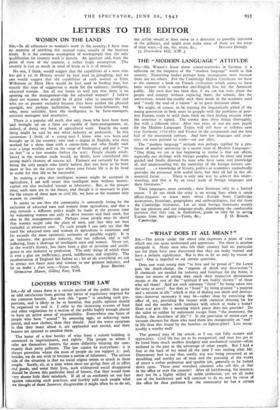LETTERS TO THE EDITOR
WOMEN ON THE LAND
SIR,—In all references to women's work in the country, I have seen no mention of anything but manual tasks, usually of the heaviest kinds. It is the common assumption of townspeople that the only qualification for country work is muscle. An ignorant and, from the point of view of the country, a rather tragic assumption. The country is just as much in need of brain as it is of muscle.
No one, I think, would suggest that the capabilities of a man who has got a 1st in History would be best used in ploughing, and no one would suggest that the capabilities of such women as Ellen Wilkinson or Myra Hess would be best used in feeding pigs, but exactly this type of suggestion is made for the ordinary, intelligent, educated woman. Are all our farms so well run that there is no opening on the management-side for educated women? I believe there are women who would be of great value to country life and who are at present excluded because they have neither the physical strength, nor perhaps inclination, to become farm-labourers, but who, most certainly, have the intelligence to be farm-managers, assistant managers and secretaries.
There is a popular old myth that only those who have been born and brought up on a farm are capable of farm-management, or, indeed, of doing any form of agricultural work. Exactly the same thing might be said by any other industry or profession. In this connexion I think of a young man I know who was born and brought up in the country, who took a degree in English, who then worked for a short time with a cotton-firm, and who finally took over a large woollen mill on the verge of bankruptcy and put it " on its feet " in a few months (before the war). People already estab- lished in the woollen trade would, no doubt, have considered this young man's chances of success nil. Farmers are certainly far from being the only people who firmly believe that you have to be born more or less on the exact spot where your future life is to be lived in order for that life to be successful.
In making. a plea that intelligent women might be accepted in agriculture, I am well aware that intelligent men without money- capital are also excluded (except as labourers). But, at the present time, such men are in the forces, and though it is necessary to plan for the return of these men to civil life, we have at the moment only women to consider.
It seems to me that the community is constantly losing by the exclusion of educated men and women from agriculture, and that a step towards a different policy might be made at the present time by welcoming women not only to drive tractors and feed stock, but also to the management-side. Perhaps some people may be afraid that women might take the place of men, and that they are best excluded at whatever cost. To such people I can only say that the need for educated men and women in agriculture is enormous and far exceeds the most optimistic estimates of possible supply. It is an industry, the greatest industry, that has suffered, and is still suffering, from a shortage of intelligent men and women. Never yet, in the world's history, has there been a glut of devotion and intelli- gence in any industry or profession. The only things of which there is ever a glut are inefficiency, greed, indifference, and stupidity. The recolonisation of England lies before us ; let us do everything we can to attract our finest men and women to our greatest industry, and let us make a start now.—Yours truly, JOAN BROOKE. Grimstone Manor, Gilling East, York.


























 Previous page
Previous page